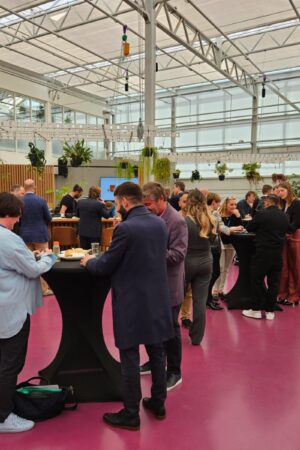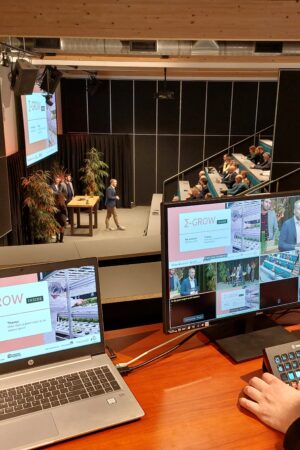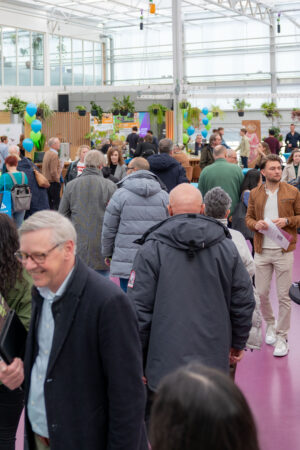Working at Vertify for 16 years, Jeroen told us about the company’s background and activities; “we are a practical research institute and we have 4 locations in the Netherlands. On 3 of these locations we have a modern greenhouse facility. There we conduct varying agricultural trials about many different subjects with various crops. It can be about fertilization, crop control, new cultivation techniques, climate, and more”. It was around 3 years ago when Vertify decided for the first time that they wanted to conduct research on cannabis. “It is not easy to get a permit and start to work with this plant. We acquired the permit together with the support of Cultivators, but it took us 2 years until we finally got the license from the government. We had to do a lot for it to happen, including renovating our facility.” Jeroen shared that a renovation was needed to comply with all regulations surrounding cannabis cultivation in the Netherlands. One of the key changes, among others, was security. Vertify had to make sure that the cannabis cultivation area was closed-off from the rest of the facility and could not be seen from the outside. They also installed extra cameras, alarms, and more. “I think we have a really nice facility. We are considering expanding the licensed area we have for cannabis with perhaps two or three extra compartments.”
Since both medicinal and recreational cannabis is legalized more and more globally, combined with the Dutch history in cannabis, this was the right time to start with a project such as CfC, Jeroen explained. “Together with World Horti Center and Cultivators, we took the initiative for this project. Worldwide, the Dutch horticulture sector is a market leader in many crops and technologies, as well as many Dutch suppliers who are present and in the global cannabis industry. Yet, with CfC, we have the opportunity to show the world that we are world leaders also in that industry, on a high professional level. And it is not only that, as Vertify, we have many years of experience working with a wide range of crops, and we can easily include cannabis. But the best part of the CfC is that we have companies who are leaders in the industry partnering for this important research. Having a consortium that involves all these professionals allows us to create a discussion between people who are the best in what they are doing, and this is a great formula to gain further knowledge.”

Some might wonder, how a group of unrelated companies with different agendas manage to agree on the same actions or decisions. “It is important to keep in mind that first of all, it is official research, therefore, the starting point is to make sure that the trials are done properly to be able to produce reliable results. From there, yes, it is true that each company has their own goals they aim to achieve with these practical trials. Nevertheless, it is not that complicated. Sometimes there are discussions, but I find it normal, we are all professionals with different experiences and opinions, for example, about crop handling or climate settings. The important thing is how we integrate all these opinions. Cultivators arrange weekly meetings with participants from all the involved parties. Then, everyone is updated on our progress on site here at Vertify. This is a guiding moment for all, when questions are asked and there is time to have a proper discussion with each other. We work towards an approach that everyone suits everyone’s needs”. Jeroen mentioned that it is the first time Vertify is collaborating with Cultivators, and immediately on such a big-scale project. “Some people could even find it so surprising that a consortium of this size is going so well. The communication with Cultivators happens naturally, as they are easy to approach and look at problems from a grower’s perspective. We have a professional relationship based on experience, support, and respect, which I believe it is really important for this consortium”.
Is it really as easy and good as it sounds? We asked Jeroen about some struggles they might have faced until now; “After getting a license, which we worked for 2 years to receive, we finally were able to start the first trial. Nevertheless, we stopped it earlier then expected. In fact, I would refer to it as a learning run, because we had difficulties with our screens and irrigation system, and later on also the dehumidification. So it took us time to get the facility, technology, and plants, under control. From there, we could only go up, and this is exactly what we have been doing since. Now we have started the 4th cultivation cycle, and there are many more to come.”
Looking into the near future, Jeroen shared his feelings about cannabis in the Netherlands; “As for Cultivation for Compounds, I still see a lot of issues and challenges that are worth looking into and research them as well, aspects like plant morphology, different cannabis varieties, etc. Outside of the CfC, I believe that for the coming 5 years there should be a lot of different trials done involving cannabis in the Netherlands.”

* Cultivation for Compounds is partly funded by PPS surcharge for research and innovation from the Ministry of Economic affairs and climate.





